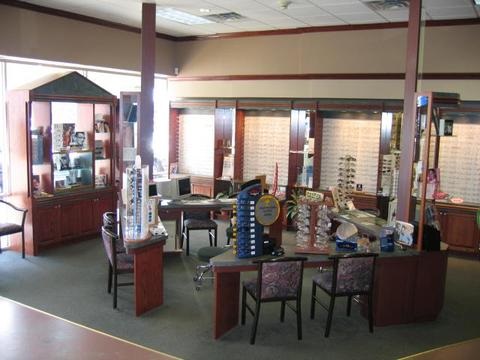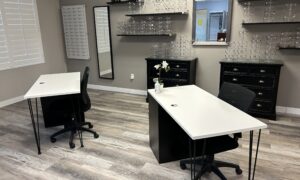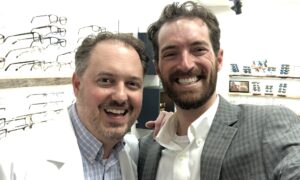By Brian Blount, OD
Optometrists can discover good ideas in unexpected places—like from their peers.
In a recent IBM research study, business CEOs worldwide cite “the rapid escalation of complexity” in their markets as the biggest challenge confronting them and their teams.
This struck me as no different for the eyecare industry in this country. We all are negotiating our way through a whirlwind of change and complexity in our national healthcare strategy, policy and reimbursement, an aging population, increasing sophisticated and effective treatments, and the new role of the optometrist as primary care doctor.
Brian Blount, OD
Downlen Road TSO
Beaumont, Texas
ODs4
Staff 12
Exams/year 6,500
Revenues >$2 million
These same CEOs in the IBM survey identify the single most important leadership competency for [organizations] seeking a path through this complexity: creativity.
As the owner of a small group practice, I have never had trouble coming up with creative ideas. The problem was getting a reality check on how effective these ideas might be if implemented. For instance, knowing that patients don’t like wasted time during their appointments, we decided that while the patient is getting their eyes dilated we would take their blood pressure. That way we are providing a useful service and making good use of the time needed for dilation.
I found a great sounding board for new ideas recently when I joined a peer-to-peer online business group, ECPinteract. Our group has a dozen ODs, and we meet online once a month for two hours. We see each other through video connections, and we can sound out creative ideas to problems. It’s great to have a place where I can throw stuff at a wall and see what sticks and what doesn’t. And in our group we have a lot of experience, so the feedback I receive from my colleagues has become invaluable.
“Failing Fast”
The goal for any optometrist is to cultivate creative approaches to the problems that challenge our practices each day, embracing experimentation with our ideas and “failing fast.”
Failing fast is a new business term that promotes the idea that it is good to experiment with new ways of doing business–but it is imperative that you determine if it is a good idea or a bad idea as quickly as possible.
Working a Common Problem: Staffing
In our ECPinteract meetings, the group comes up with topics that everyone wrestles with. For example, we all are challenged to find good staff and to train them and retain them as employees. At a meeting, the group started talking about using Craig’s List. I had never used it, though I was surprised to find that my office manager was already using it, along with everyone else in the group. When I heard what everyone had to say about it, I could see how easy it was to use Craig’s List and how helpful. It was a simple thing, but I had never really considered using it before.
I always have a number of ideas I am going to try, but many of them never make it past the idea stage thanks to a few friends and colleagues. I have discovered that if I share my “good ideas” with a colleague or two, they quickly either poke holes in it, or frankly, make it even better by adding their own ideas. This has been a great testing ground for me and certainly a way of “failing fast.”
Without this grounding and testing of my ideas, every decision I make would feel like pure guesswork. By sharing my ideas, discussing them and receiving open and honest feedback, I have been able to dramatically accelerate the path to implementation of ideas that work for my practice.
About ECPinteract…
ECPinteract is a virtual peer learning community providing ODs with access to the best minds in the eyecare field–their peers. The program is designed to help ODs to learn from their peers’ experiences, past mistakes and successes, and to help ODs achieve their full potential and grow their practice.
To learn more: http://www.ecpinteract.com/
Sharing What Works
ECPinteract also gives me a chance to share what’s worked for me. On training staff, for example, we rely on support materials from manufacturers, like Essilor, and also from AOA which has training modules. There are really good online programs that we use all the time. I described how we use their programs to train new staff, and some others in the group wanted to know how to get started with that.
Another great discussion we’re having is on practice efficiency. We’ve done the OD Lean program and looked at how we spend our time. We’ve examined steps we can take to make sure we’re highly effective and also that our patients aren’t waiting a long time to see us. We’ve specifically looked at streamlining the numbers of contact lenses that we stock, so we can provide quick access and not have patients waiting to get their contacts.
A new discussion we’re having is on the back-to-school time of year. We’re batting around creative ideas about how to move some of our seniors away from having exams at that busy time of year and seeing them later in the year, like around Thanksgiving. We’ve got more time then, and seniors are sensitive about not being rushed.
Being able to bounce ideas off of colleagues every month has been a gift. The participants in my group come from all across the country, so it’s not my competitor up the street. Best of all, I love to share stuff. A lot of great ideas that we’ve implemented in our practice are ones that have been shared with us from other practices.
Related ROB Articles
Peer Business Groups Can Serve as Your Ground Crew
The Power of Peer-to-Peer Learning
Peer Advisory Groups: You Can Learn from Non-ODs, Too
Brian Blount, OD, practices atDownlen Road TSO in Beaumont, Texas. To contact him: bjbod@aol.com.



























